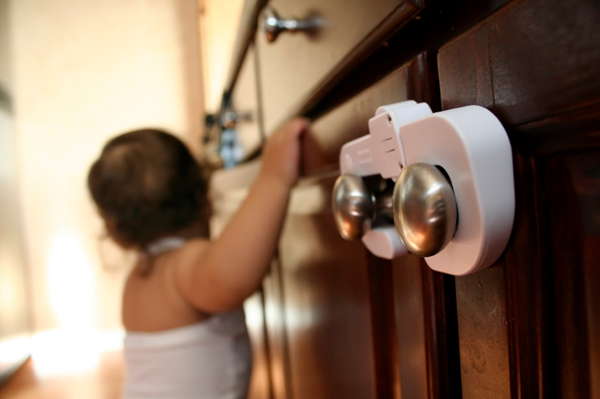
Baby proofing your rental home is necessary to keep your baby safe and your sanity intact. Knowing your baby can play in a house that is safe will give you peace of mind — but what should you do if you live in a rental home, apartment or condo?
Pool fences options for rental homes
Protecting your child from drowning should be at the top of your baby-proofing list. A pool fence is a must and all apartments should already come equipped with a standard pool fence. If your rental home does not have a pool fence, talk with your landlord about putting one in — and be prepared to possibly split the cost or pay for it completely. You can also consider a kid-safe pool safety net. You cannot put a price on safety and the importance of putting a barrier around your pool cannot be stressed enough. At the very least, install alarms on all your doors so you know when they are open and place locks up high so children cannot reach them to open the door.
Here are some baby-proofing tips for your bathroom >>
Baby gates
Another concern for parents who rent is installing baby gates. If you want to gate a room off from the rest of the house, a pressure-mounted gate is easy to use and doesn't require drilling into the wall. If your rental home has stairs, you must install a permanent or hardware-mounted gate that is drilled into the wall for safety. Talk to your landlord about this and be aware that you may have to pay for any wall repairs once the gate is removed — but it is worth it to protect your baby from falling down the stairs. A permanent gate must be installed at the top of the stairs, however a pressure-mounted gate will be fine for the bottom of the stairs. Most experts recommend stair gates from ages 0-2.
Upper level apartments and two-story homes
If you live in the upper level of an apartment or a two-story house, do not place Baby's crib or other furniture near a window, as many children are injured each year by climbing and falling out of windows. In fact, a study showed that an average of 14 children are injured each day from falling out of windows. The highest risk group is age 2, with boys falling out of windows more than girls.
Anchor all furniture and heavy appliances
Make sure you anchor all furniture and heavy appliances, including shelves, dressers, TV stands and refrigerators to the wall to prevent them from falling on top of Baby if he decides to try to climb on the furniture — as curious babies and toddlers tend to do. Use a strap or L-shaped bracket to drill into the wall. Your landlord should not have an issue with this, as it won't leave a large hole in the wall.
Cabinet lock options for rental homes
It is a good idea to install cabinet locks in your kitchen and bathrooms, however some of these devices do require drilling into the wood. Talk to your landlord first for approval and be aware you may have to pay for repairs once the hardware is removed. Another option is installing drill-free cabinet locks, which often feature a handle lock that fits outside of the cabinet. Other options include putting a gate up to prevent your child from getting into the kitchen or bathroom — or simply remove all dangerous items and put them up and out of reach.
Outlet covers
Lastly, outlet covers are inexpensive, easy to install and are easy to remove when you move out.
Check out the top 10 baby-proofing mistakes >>
More on safety
Do baby monitors really keep babies safe?
Child safety checklist for the home
Crib safety: Is your baby's sleep space safe?